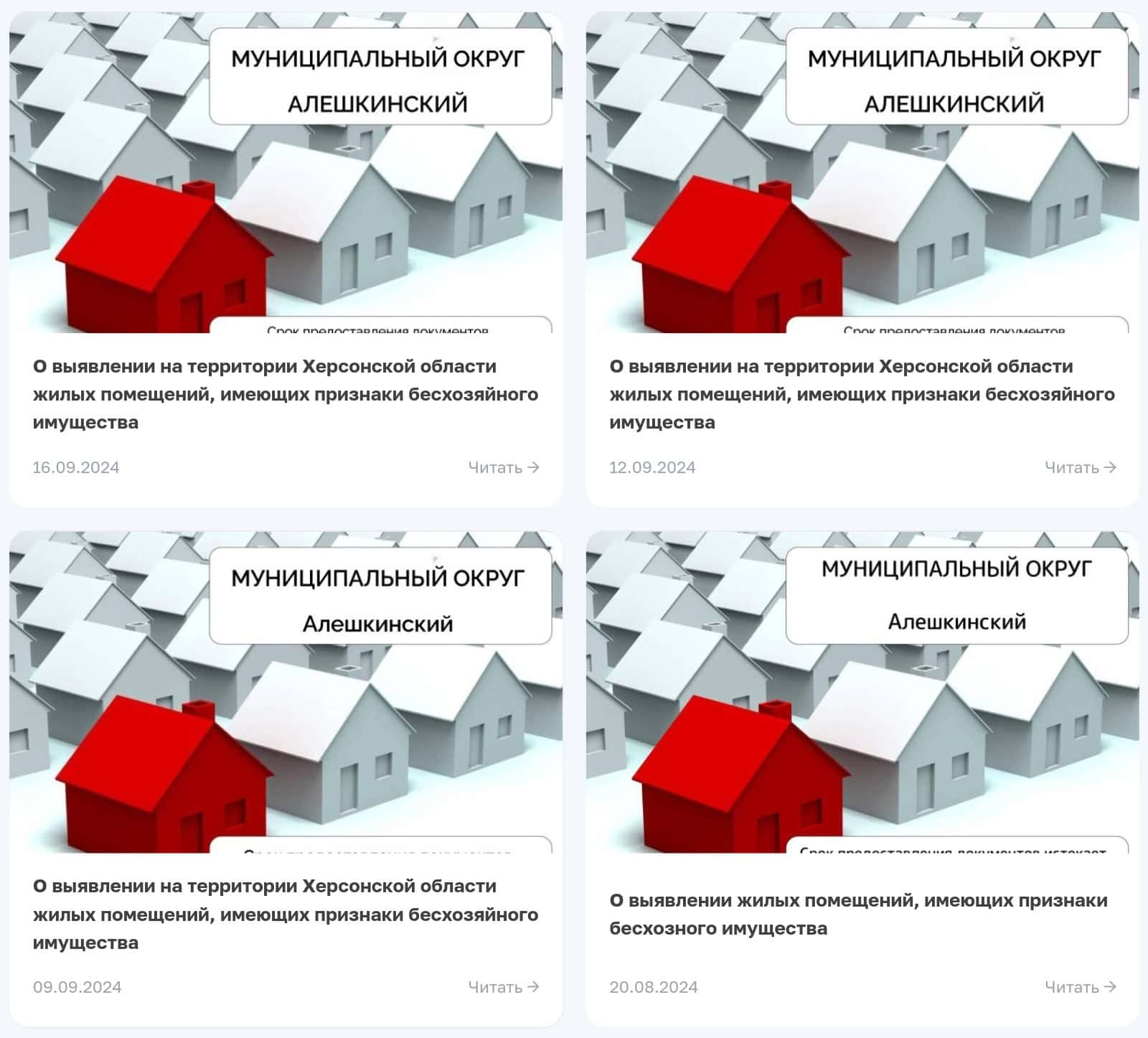

Within three weeks, occupation administrations have published 2,521 addresses of real estate to take away from owners
At least 821 addresses of real estate “with signs of ownerlessness” were published by the occupation administrations in four regions of Ukraine in the first week of September 2024. In the three weeks since the start of the count, at least 2,521 addresses of “ownerless property” have been published.
The relevant announcements of the occupation municipal and regional administrations state that the owners of such housing can claim their rights to it by contacting the occupation administrations in person with an identity document, taxpayer identification number and documents certifying the right to the housing.
If the owners do not come forward with the documents within 30 days of the announcement, their property will be transferred to “state” or “municipal” ownership.
The text of the announcements makes it clear that homeowners must present Russian documents.
As can be seen from the announcements, the housing audit is taking place in all Russian-occupied territories except Crimea, including those parts of the Donetsk and Luhansk regions over which Ukraine lost control in 2014-2015. Russia annexed all of these territories in September 2022, but in the parts of the Donetsk and Luhansk regions occupied since 2014-2015, property had been taken away from its rightful owners long before the annexation. Since recently, all occupied territories have had to register ownership in the Russian State Register.
In the second week of September, as in the first week, the occupation administrations in the Luhansk “republic” published the most addresses of real estate “with signs of ownerlessness”. The occupation administrations of Krasnyi Luch (officially renamed Khrustalnyi in Ukraine; 111 addresses) in the occupied part of Luhansk region and Mariupol (100 addresses) in the occupied part of Donetsk region found the most “ownerless” real estate.
A significant number of local occupation administrations have published round numbers of addresses of “ownerless” real estate (mostly 10, 20 addresses), which may indicate that they have certain criterions “from above”.
At the same time, the occupation administration of Rubizhne in the Luhansk region also published lists of 79 addresses, the owners of which were allegedly able to confirm their right to the property in question. As can be seen from the lists, these are addresses entered in the register of property “with signs of ownerlessness” in July-September 2024, and one address entered in May.
The head of the occupation administration of the “Sverdlovsk municipal district” in Luhansk region, Andrei Sukhachev, told that a total of 297 addresses of “ownerless” property had been identified and described the procedure for depriving owners of their rights to it.
According to him, if the owners do not come forward or fail to prove their right to the property within 30 days of the list’s publication, the property is registered with the Russian Cadaster as ownerless. Three months later, the occupation administration applies to the “court” to transfer the property to “municipal ownership”. According to Sukhachyov, there are currently three such lawsuits pending in the “court”.
Also, the occupation administration of the “Perevalsk municipal district” in Luhansk region published “Procedure for consideration of applications for temporary use of ownerless residential premises…”.
The occupation administrations of different regions do not have common criteria for defining property as “ownerless”. In the Luhansk “republic”, this criterion was the long-term non-payment of utility bills by the owners. From the occupied part of the Zaporizhzhia region, reports on the work of special commissions that check whether people living in an apartment or house have documents confirming their ownership of the property.
Local media report difficulties registering or getting confirmation of real estate ownership in the occupied territories due to the lack or complete absence of notaries.
In addition, there are reports of an increase in the number of cases of Ukrainian refugees failing to pass the filtering measures in Russia while trying to return from abroad to obtain Russian documents and confirm their ownership of property in the occupied territories. Entry to the occupied territories of Ukraine from outside Russia is possible only after passing a special check at the Russian Sheremetyevo airport by representatives of the Russian security services.
Residents of the occupied territories can obtain a Russian passport only until the end of 2024. Those locals who are unwilling or unable to do so will have only the rights of foreigners under Russian law in their occupied regions.